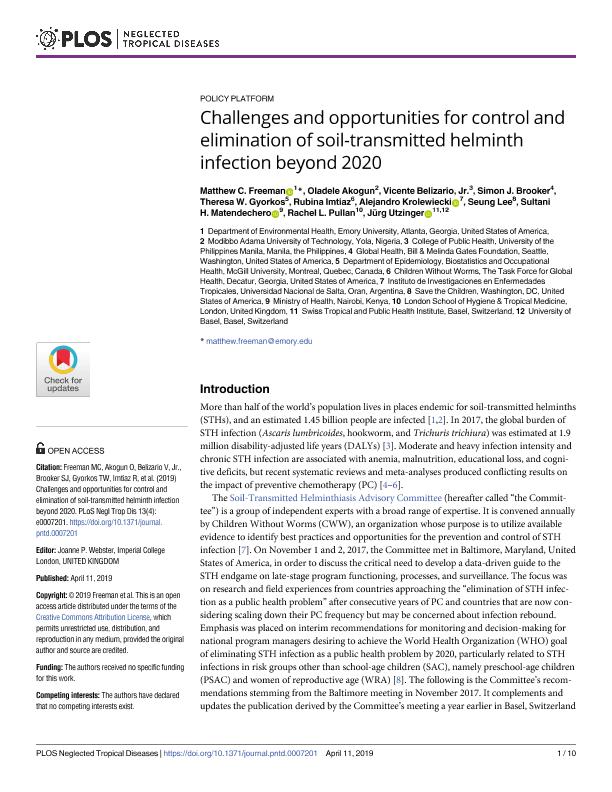Mostrar el registro sencillo del ítem
dc.contributor.author
Freeman, Matthew C.

dc.contributor.author
Akogun, Oladele
dc.contributor.author
Belizario, Vicente
dc.contributor.author
Brooker, Simon J.
dc.contributor.author
Gyorkos, Theresa W.
dc.contributor.author
Imtiaz, Rubina
dc.contributor.author
Krolewiecki, Alejandro Javier

dc.contributor.author
Lee, Seung Hwa

dc.contributor.author
Matendechero, Sultani H.

dc.contributor.author
Pullan, Rachel L.
dc.contributor.author
Utzinger, Jürg

dc.date.available
2021-01-20T02:04:25Z
dc.date.issued
2019-04-11
dc.identifier.citation
Freeman, Matthew C.; Akogun, Oladele; Belizario, Vicente; Brooker, Simon J.; Gyorkos, Theresa W.; et al.; Challenges and opportunities for control and elimination of soil-transmitted helminth infection beyond 2020; Public Library of Science; Neglected Tropical Diseases; 13; 4; 11-4-2019; 1-10
dc.identifier.issn
1935-2735
dc.identifier.uri
http://hdl.handle.net/11336/123114
dc.description.abstract
More than half of the world’s population lives in places endemic for soil-transmitted helminths (STHs), and an estimated 1.45 billion people are infected. In 2017, the global burden of STH infection (Ascaris lumbricoides, hookworm, and Trichuris trichiura) was estimated at 1.9 million disability-adjusted life years (DALYs). Moderate and heavy infection intensity and chronic STH infection are associated with anemia, malnutrition, educational loss, and cognitive deficits, but recent systematic reviews and meta-analyses produced conflicting results on the impact of preventive chemotherapy (PC).
The Soil-Transmitted Helminthiasis Advisory Committee (hereafter called “the Committee”) is a group of independent experts with a broad range of expertise. It is convened annually by Children Without Worms (CWW), an organization whose purpose is to utilize available evidence to identify best practices and opportunities for the prevention and control of STH infection. On November 1 and 2, 2017, the Committee met in Baltimore, Maryland, United States of America, in order to discuss the critical need to develop a data-driven guide to the STH endgame on late-stage program functioning, processes, and surveillance. The focus was on research and field experiences from countries approaching the “elimination of STH infection as a public health problem” after consecutive years of PC and countries that are now considering scaling down their PC frequency but may be concerned about infection rebound. Emphasis was placed on interim recommendations for monitoring and decision-making for national program managers desiring to achieve the World Health Organization (WHO) goal of eliminating STH infection as a public health problem by 2020, particularly related to STH infections in risk groups other than school-age children (SAC), namely preschool-age children (PSAC) and women of reproductive age (WRA) [8]. The following is the Committee’s recommendations stemming from the Baltimore meeting in November 2017. It complements and updates the publication derived by the Committee’s meeting a year earlier in Basel, Switzerland, and was instrumental in shaping the agenda for the October 2018 meeting, convened jointly by CWW and WHO, with recommendations to be reported elsewhere.
dc.format
application/pdf
dc.language.iso
eng
dc.publisher
Public Library of Science

dc.rights
info:eu-repo/semantics/openAccess
dc.rights.uri
https://creativecommons.org/licenses/by/2.5/ar/
dc.subject
NEGLECTED TROPICAL DISEASES
dc.subject
SOIL TRANSMITTED HELMINTH
dc.subject
DEWORMING
dc.subject
ANTIHELMINTIC
dc.subject
HELMINTH
dc.subject.classification
Enfermedades Infecciosas

dc.subject.classification
Ciencias de la Salud

dc.subject.classification
CIENCIAS MÉDICAS Y DE LA SALUD

dc.title
Challenges and opportunities for control and elimination of soil-transmitted helminth infection beyond 2020
dc.type
info:eu-repo/semantics/article
dc.type
info:ar-repo/semantics/artículo
dc.type
info:eu-repo/semantics/publishedVersion
dc.date.updated
2020-11-18T20:49:56Z
dc.journal.volume
13
dc.journal.number
4
dc.journal.pagination
1-10
dc.journal.pais
Estados Unidos

dc.description.fil
Fil: Freeman, Matthew C.. University of Emory; Estados Unidos
dc.description.fil
Fil: Akogun, Oladele. Modibbo Adama University of Technology; Nigeria
dc.description.fil
Fil: Belizario, Vicente. University of The Philippines Manila; Filipinas
dc.description.fil
Fil: Brooker, Simon J.. Bill And Melinda Gates Foundation; Estados Unidos
dc.description.fil
Fil: Gyorkos, Theresa W.. McGill University; Canadá
dc.description.fil
Fil: Imtiaz, Rubina. The Task Force for Global Health; Estados Unidos
dc.description.fil
Fil: Krolewiecki, Alejandro Javier. Universidad Nacional de Salta. Sede Regional Orán. Instituto de Investigación de Enfermedades Tropicales; Argentina. Consejo Nacional de Investigaciones Científicas y Técnicas. Centro Científico Tecnológico Conicet - Salta; Argentina
dc.description.fil
Fil: Lee, Seung Hwa. Save the Children; Estados Unidos
dc.description.fil
Fil: Matendechero, Sultani H.. Ministry of Health; Kenia
dc.description.fil
Fil: Pullan, Rachel L.. London School of Hygiene & Tropical Medicine; Reino Unido
dc.description.fil
Fil: Utzinger, Jürg. Swiss Tropical and Public Health Institute; Suiza. University of Basel; Suiza
dc.journal.title
Neglected Tropical Diseases

dc.relation.alternativeid
info:eu-repo/semantics/altIdentifier/doi/http://dx.doi.org/10.1371/journal.pntd.0007201
dc.relation.alternativeid
info:eu-repo/semantics/altIdentifier/url/https://journals.plos.org/plosntds/article?id=10.1371/journal.pntd.0007201
Archivos asociados
